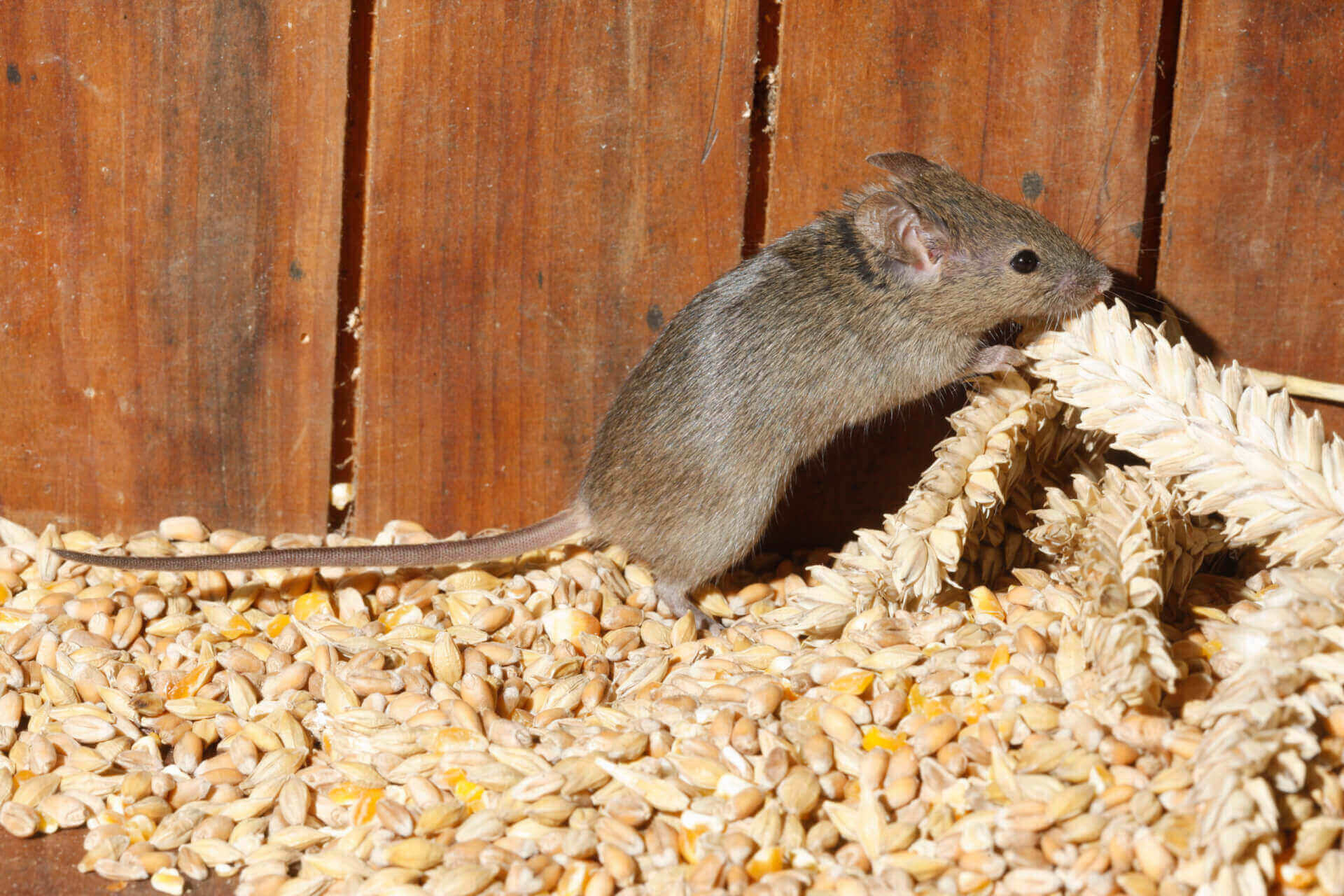House Mouse Facts & Information
Everything you need to know about house mice
what do House Mice look like

House mice can be found throughout the United States. House mice are typically dusty gray with cream-colored bellies. Fur color varies from light brown to dark gray depending on the mouse’s location. House mice have four legs and a round shaped body. Their muzzles are pointed, and their ears are large with some hair. House mice range from 2.5 to 3.75 inches long. Their tails are usually 2.75 to 4 inches long – usually as long as their body is. They have large ears and their droppings are pointed, about the size of a grain of rice. In nature, mice prefer to eat cereal and seeds, but they will also eat insects, nuts and fruits. Inside structures, mice will consume almost any human food, but prefer grain based products.
House mice are very social. They organize themselves in social hierarchies with one male dominating lower-ranking males and a large number of females in a given territory. Mature male mice are socially compatible with related mice, but they are hostile and aggressive towards strangers. The size of a house mouse’s territory varies, but it is frequently no larger than 4-5 feet. The size of the territory varies based on the availability of food and water. They are excellent climbers and can jump up to a foot high; however, they are colorblind and cannot see clearly beyond six inches.
House mice breed rapidly and can adapt quickly to changing conditions. In fact, a female house mouse can give birth to a half dozen babies every three weeks and can produce up to 35 young per year. In the wild, they will live about a year but in your home or business with the shelter from natural predators, they can live up to 3 years! And they will breed the entire time, so when you first see one, be sure to call in a mouse exterminator immediately.Not the mouse you have?
House mice are very social. They organize themselves in social hierarchies with one male dominating lower-ranking males and a large number of females in a given territory. Mature male mice are socially compatible with related mice, but they are hostile and aggressive towards strangers. The size of a house mouse’s territory varies, but it is frequently no larger than 4-5 feet. The size of the territory varies based on the availability of food and water. They are excellent climbers and can jump up to a foot high; however, they are colorblind and cannot see clearly beyond six inches.
House mice breed rapidly and can adapt quickly to changing conditions. In fact, a female house mouse can give birth to a half dozen babies every three weeks and can produce up to 35 young per year. In the wild, they will live about a year but in your home or business with the shelter from natural predators, they can live up to 3 years! And they will breed the entire time, so when you first see one, be sure to call in a mouse exterminator immediately.Not the mouse you have?
How Did I Get House Mice
House mice live in structures, but they can survive outdoors, too. House mice prefer to nest in dark, secluded areas and often build nests out of paper products, cotton, packing materials, wall insulation, and fabrics. House mice are nocturnal, but they can be spotted in the house during the day. House mice are very inquisitive and tend to curiously investigate changes in their habitats. They will often change their established runways for this reason. Mice only need a hole the size of a dime to squeeze through to get into any building and your home is no different. If you have cracks and crevices in your foundation, drains that are not properly sealed, screens with tears in them, etc., then deer mice can get in. Having professional exclusion work can help with that.
If you have open bags of pet food or bird seed, they will seek it out. Mice are also attracted to garbage and rotting food so if you store your garbage in the basement until garbage day, you may want to invest in outdoor garbage cans that can be tightly sealed. You’ll probably see raccoon prints on them, but as long as they can seal and lock, they shouldn’t be able to get in them and make a mess. And the garbage will be outside your home instead of inside attracting mice, rats, cockroaches, and flies.
If you have open bags of pet food or bird seed, they will seek it out. Mice are also attracted to garbage and rotting food so if you store your garbage in the basement until garbage day, you may want to invest in outdoor garbage cans that can be tightly sealed. You’ll probably see raccoon prints on them, but as long as they can seal and lock, they shouldn’t be able to get in them and make a mess. And the garbage will be outside your home instead of inside attracting mice, rats, cockroaches, and flies.
What Problems Do House Mice Cause
House mice can pose serious health threats. House mice can carry diseases and contaminate stored food that they eat in the home. House mice have been implicated in the spread of salmonella through their feces. Humans can become ill by consuming salmonella contaminated food. Symptoms of salmonellosis include diarrhea, fever and abdominal pain. House mice may also spread rat bite fever, although this is uncommon. Humans can catch this bacteria-borne infectious disease through contact with a dead mouse or by consuming food contaminated by mouse feces. Symptoms of rat bite fever may appear between 3 and 10 days after contact with a contaminated mouse and include fever, vomiting, headache, rash and muscle pain.
Micro droplets of mouse urine can cause allergies in children. House mouse feces in the home carries bacteria. Inhaling dust that contains dried feces may cause allergies or asthma flare ups. Furthermore, mice can also bring fleas, mites, ticks, and lice into your home. If you suspect that your symptoms are associated with rodent infestation, seek medical attention. Be sure to tell your doctor if you suspect contact with rodents or rodent droppings. Our mouse control methods will help.
Micro droplets of mouse urine can cause allergies in children. House mouse feces in the home carries bacteria. Inhaling dust that contains dried feces may cause allergies or asthma flare ups. Furthermore, mice can also bring fleas, mites, ticks, and lice into your home. If you suspect that your symptoms are associated with rodent infestation, seek medical attention. Be sure to tell your doctor if you suspect contact with rodents or rodent droppings. Our mouse control methods will help.
How Can I Prevent House Mice
Look at the walls, ceilings, floors, and around pipes and wires on the inside of your house for holes and other points of entry. These openings may have a dirty or oily marking around them. A mouse can fit through a hole about the size of a dime (or a pencil), and a rat can fit through a hole about the size of a quarter, so the hole doesn’t need to be big to invite them in. Outside your house be sure to seal around pipes and wires and make sure the foundation is free of cracks and crevices. If it’s not, have them professionally sealed. If possible, seal off/plug outdoor holes with rodent-proof materials (copper mesh, hardware cloth, and silicone sealant). Have door sweeps installed under doors. Keep in mind that many mice come in the same way you do – through an open door! Be sure to close doors and have screen doors installed if you want the fresh air. Make sure those screens don’t have any holes, though. Besides house mice, flies, ants, and any other pest can come in through a torn screen.
All pests look for food, water, and shelter. It’s very important to remove access to these items to prevent an infestation. Clean up crumbs and spills, and store food (including pet food) up off the floor and in sealed, hard containers with tight-fitting lids. Fix dripping faucets and leaking pipes. Keep living areas clean and uncluttered. Keep yards and vacant lots maintained by mowing and utilizing regular trash pickup. Be sure to share any mice sighting information with neighbors. Mice don’t stay in one place.
All pests look for food, water, and shelter. It’s very important to remove access to these items to prevent an infestation. Clean up crumbs and spills, and store food (including pet food) up off the floor and in sealed, hard containers with tight-fitting lids. Fix dripping faucets and leaking pipes. Keep living areas clean and uncluttered. Keep yards and vacant lots maintained by mowing and utilizing regular trash pickup. Be sure to share any mice sighting information with neighbors. Mice don’t stay in one place.
Why Waltham for House Mice Control
We’re passionate about keeping mice out of your home or business because we live and work here – it’s our neighborhood, too. With our 130 years of experience keeping homes and businesses in Massachusetts, Connecticut, New York, Maine, Vermont, New Hampshire, and Rhode Island safe from pests, Waltham has the experience you can trust.
Satisfaction Guarantee
24-Hour Guaranteed Response
Board Certified Entomologists
Need help with house mice?
GET A QUOTE
“Exceptional service. Prompt and professional. Used for both business and home. Very efficient and honest.”
Agawan, MA
